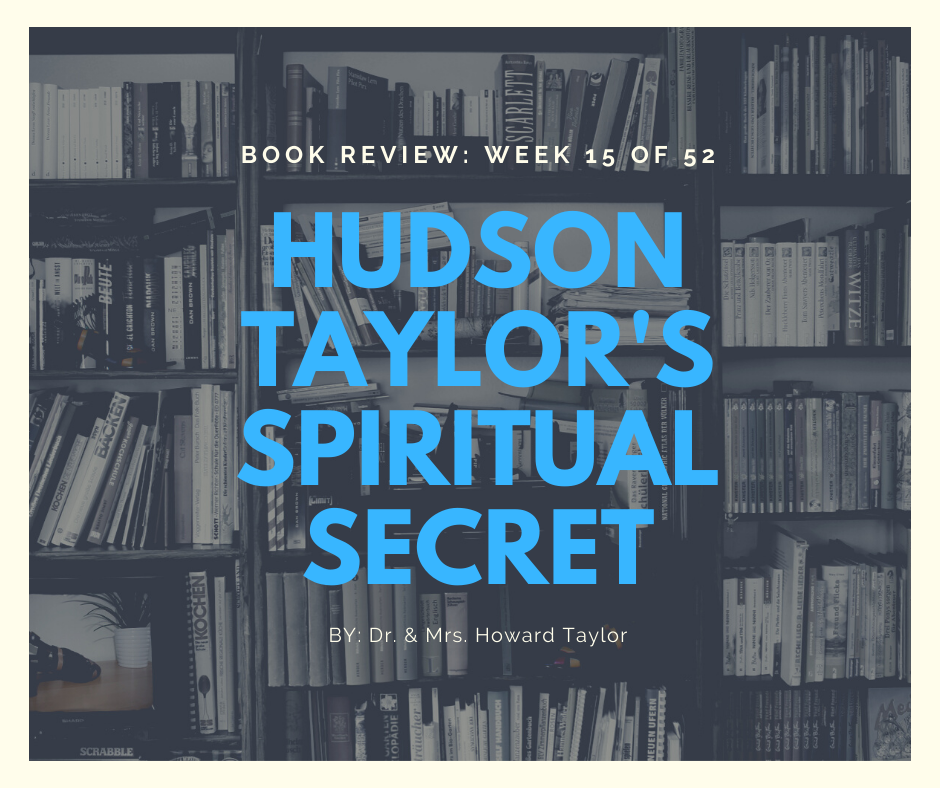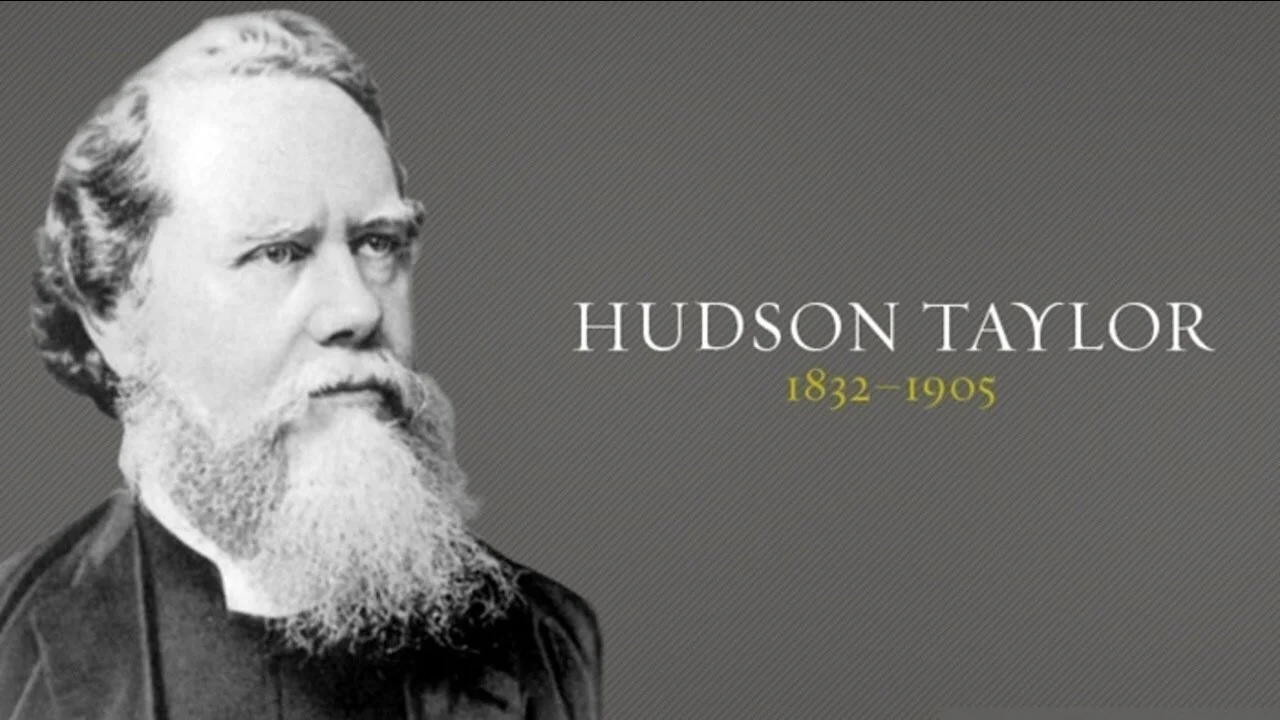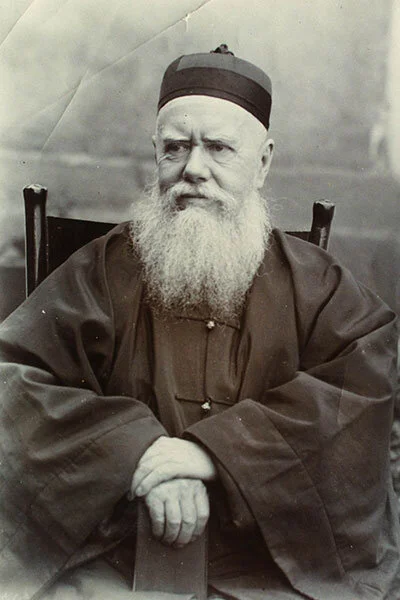Hudson Taylor's Spiritual Secret - A Review
“I am no longer anxious about anything… for He, I know, is
able to carry out His will, and His will is mine”– James Hudson Taylor
Anxiety. Something many people in America and around the world are feeling at this moment.
With the ever-present fears of COVID-19 being far from over, the 22 million and rising Americans who have filed for unemployment, and utter uncertainty of the global future, this is a season of exceptional anxiety.
How is it that Hudson Taylor, who at seasons in his life had less than dollar equivalent to his name, could say in the late 1800s,
“I am no longer anxious about anything…” (p. 165).
Truly, those who commented on first meeting the mild-mannered, slight built, and soft-voiced pioneer missionary to China said he seemed "at peace."
This is week 15 of 52 in the Tim Challies 2020 reading challenge, and the assignment for the week was a book by or about a missionary. I chose, by my lovely wife’s recommendation, Hudson Taylor’s Spiritual Secrets by his second Son and wife, Dr. & Mrs. Howard Taylor.
Howard and his wife walk the reader through the life of Mr. and Mrs. Taylor with the overwhelming tone of an exceptionally proud son and daughter-in-law.
Originally published in 1932, I read the updated edition from 2009, published by my alma mater's publishing house, Moody Publishers Chicago, with a foreword by George Verwer.
This biography is exceptionally personal to read as it comes from the eyes of a son reflecting upon the legacy of his parents. It is packed with excerpts of letters, news articles, journal entries, and gives full life to James Hudson Taylor!
By way of clarification, it has come about in recent days to criticize Taylor for the influence of the Keswick Movement on his theology. Not to digress to far, I will just say I agree with Piper’s position in 21 Servants of Sovereign Joy, that Taylor “was not one of those worst exponents, and that he was protected from Keswick’s worst flaws by his allegiance to the Bible, his experience of lifelong suffering and sorrow, and his belief in the sovereignty of God” (p. 793).
The following are some of the lessons that I learned reading through Hudson Taylor’s Spiritual Secret.
Annihilate Anxiety
What is the cure to anxiety?
Especially now! How can we be calm amid the chaos?
“Seek first the kingdom of God and his righteousness, and all these things will be added unto you” – Matthew 6:33
Hudson Taylor’s story is one lived by faith and union with Jesus Christ, seeking his kingdom and righteousness.
By faith, Taylor trusted in God by giving everything.
As a young man, James Hudson wrestled with God to discern if he would be blessed to be sent to China. He chose to be a servant locally, reasoning if he could not serve those next to him how could he hope to serve those an ocean away?
While visiting and praying with a man who had nothing, whose wife was dying, he felt compelled by God to give this man the last coin he had to his name.
A half-crown. Equivalent to about sixty cents.
But he gave it. He gave it all. Believing God's promises to be worth more than his half-crown.
“In parting with that coin I was giving him my all… and how the joy came back in full flood tide to my heart! I could say anything and feel it then, and the hindrance to blessing was gone – gone, I trust, forever" (p. 38).
At the turn of 1870, there was great unrest in China. The Tientsin Massacre occurred where Christian Missionaries were being hunted and killed for their teachings.
Several questioned Hudson as to why he could continue to work almost unaffected by the circumstances about them. His thought was simple.
“What we need is to be drinking – yes, thankful for each occasion which drives us to drink ever more deeply of the living water” (p. 186).
Religion vs. Relationship
In times of desperation, affliction, pain, or a global pandemic, people want to turn to religion.
There is comfort in wise words that make sense of the moment. But when the moment is gone, the pain subsided, religion tends to fade to comfort, entertainment, and personal ambition.
The difference between circumstantial religion and true religion, while much, is certainly in part a matter of relationship.
“Once I used to try and think very much and very often about Jesus, but I often forgot Him. Now I trust Jesus to keep my heart remembering Him, and He does so. This is the best way.” (p. 181).
When an illness prevented his movement and work, he commented:
“One of the happiest periods of my life was that period of forced inactivity, when one could do nothing but rejoice in the Lord and “wait patiently” for Him, and see Him meeting all one’s need.” (p. 207)
Hudson saw pain and outside pressure as only pushing us further into Christ.
“It doesn’t matter, really, how great the pressure is… it only matters where the pressure lies. See that it never comes between you and the Lord – then, the greater the pressure, the more it presses you to His breast.” (p. 153).
Presence of Prayer
In the providence of God, I have read several books in a short amount of time on prayer. Reading the life of James Hudson Taylor made one critical thing evident.
The man’s life was marked by the presence of prayer.
“From two to four A.M. was the time he usually gave to prayer; the time when he could be most sure of being undisturbed to wait upon God. That flicker of candlelight has meant more to (missionaries and those he missioned too) than all they have read or heard on secret prayer; it meant reality, not preaching but practice” (p. 239).
One young man later commented that the prayers of Taylor were paralleled to that of Charles Spurgeon.
Taylor resolved not to ask for funding or financial gifts, deciding rather trust in God prompting the hearts of his children to give toward the work.
Many nights he spent on his knees as the mission was down to its last pound, only to receive the next day or that night the exact or greater amount that was needed.
Hudson Taylor experienced the power of prayer when a heart is wholly God’s.
I thoroughly enjoyed this book, and it has laid yet another conviction upon my soul concerning the lost. When I compare the things that keep me up at night to those that kept Taylor up, I am ashamed.
For he would often tell himself, millions are dying in China every month, all lost without the hope of the gospel. How can I not pray?
My challenge to myself is to start where Taylor started. If I cannot serve where I am, how can I expect to serve an ocean away?
“If we are faithful to God in little things, we shall gain experience and strength that will be helpful to us in the more serious trials of life” (p. 39).
Hudson Taylor chose to surrender all to Jesus, and in return, he was given what he desired. He became one of the most celebrated missionaries to China, starting the China Inland Mission, now, over 150 years later, Overseas Missionary Fellowship (OMF) International.
“At the time of Taylor’s death, the China Inland Mission was an international body with 825 missionaries living in all eighteen provinces of China; more than three hundred mission stations; more than five hundred local Chinese helpers; and twenty-five thousand Christian converts” (Piper, p. 802).
I will leave you with the parting words of Howard records at the end of his book from his father.
“Take time. Give God time to reveal Himself to you. Give yourself time to be silent and quiet before Him, waiting to receive, through the Spirit, the assurance of His presence with you, His power working in you. Take time to read His Word as in His presence, that from it you may know that He asks of you and what He promises you. Let the Word around you, create within
you a holy atmosphere, a holy heavenly light, in which your soul will be
refreshed and strengthened for the work of daily life” (p. 239-240).














John Owen came from Welsh descent, was educated at Queens College, and became a renowned Puritan theologian, Oxford professor, and passionate pastor who lived from 1616 to 1683. In 1647, he wrote the exhaustive treatise The Death of Death defending Limited or Definite Atonement against the Arminian view of Universal Atonement or Unlimited Atonement.